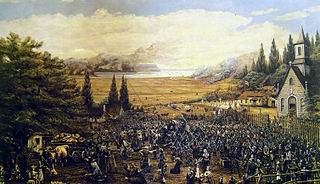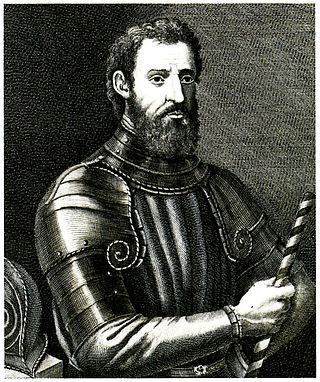Related Research Articles

1755 (MDCCLV) was a common year starting on Wednesday of the Gregorian calendar and a common year starting on Sunday of the Julian calendar, the 1755th year of the Common Era (CE) and Anno Domini (AD) designations, the 755th year of the 2nd millennium, the 55th year of the 18th century, and the 6th year of the 1750s decade. As of the start of 1755, the Gregorian calendar was 11 days ahead of the Julian calendar, which remained in localized use until 1923.

Giovanni da Verrazzano was an Italian (Florentine) explorer of North America, in the service of King Francis I of France.
This section of the timeline of United States history concerns events from before the lead up to the American Revolution.

The Province of Carolina was a province of the Kingdom of England (1663–1707) and later the Kingdom of Great Britain (1707–1712) that existed in North America and the Caribbean from 1663 until the Carolinas were partitioned into North and South on January 24, 1712.

Sir John Yeamans, 1st Baronet was an English colonial administrator and planter who served as Governor of Carolina from 1672 to 1674. Contemporary descriptions of Yeamans described him as "a pirate ashore."
Alexander Gordon, fought as a Royalist and was captured by Oliver Cromwell's army at the Battle of Worcester on 3 September 1651 at the end of the English Civil War. He was imprisoned at Tothill Field outside London over the winter of 1651–1652. He was transported to the New World in 1652 and entered into indentured servitude. His later victory over servitude became the legal precedent in Massachusetts.

The early province of Carolana was the land forming the southern English colonies, spanning from 31° to 36° north latitude. In 1629, King Charles I of England granted the territory to his attorney general Sir Robert Heath. The original charter claimed the land from Albemarle Sound in present-day North Carolina, to the St. Johns River in the south, just miles below the current Florida-Georgia state line. The region as a whole comprised all or parts of the modern-day states of Louisiana, Mississippi, Alabama, Florida, Georgia, South Carolina and North Carolina. Charles I named the colony for himself, the name Carolana being derived from Carolus, the Latin form of Charles.
Thomas Cornwallis was an English politician and colonial administrator. Cornwallis served as one of the first Commissioners of the Province of Maryland, and Captain of the colony's military during the early years of settlement. In a 1638 naval engagement with Virginian colonists, he captured Kent Island in Maryland.

Pleasure Island is a coastal barrier island in Southeastern North Carolina, United States, just south of the City of Wilmington. Pleasure Island is located within Federal Point Township, in New Hanover County. The coastal resort towns of Carolina Beach and Kure Beach, as well as the annexed communities of Wilmington Beach and Hanby Beach are located on the island. The southern end of Pleasure Island was separated from Bald Head Island by Corncake Inlet until the inlet was shoaled and closed in 1998 by Hurricane Bonnie; thus Pleasure Island and Bald Head Island are no longer separate islands.

Samuel Fuller was a passenger on the historic 1620 voyage of the Pilgrim ship Mayflower and became a respected church deacon and the physician for Plymouth Colony.
Walter Palmer (1585–1661) was an early Separatist Puritan settler in the Massachusetts Bay Colony who helped found Charlestown and Rehoboth, Massachusetts and Stonington, Connecticut.
Peter Folger or Foulger was a poet and an interpreter of the American Indian language for the first settlers of Nantucket. He was instrumental in the colonization of Nantucket Island in the Massachusetts colony. He was the maternal grandfather of Benjamin Franklin.

Naumkeag is a historical tribe of Eastern Algonquian-speaking Native American people who lived in northeastern Massachusetts. They controlled most of the territory from the Charles River to the Merrimack River at the time of the Puritan migration to New England (1620–1640).
Richard Austin (1598–1645) was an early Puritan colonist who landed in Boston Harbor, Massachusetts on 16 May 1638 on board a ship called the Bevis. He was the immigrant paternal English ancestor and great-great-great-grandfather of Stephen F. Austin, empresario, considered the "father of Texas" and founder of Texas.
The ship James made several trips during the early 17th century Great Migration out of England to the New World. It is unclear how many ships were named James during the Great Migration, as the name James was very popular in England during the reign of James I of England (1567–1625).

The English overseas possessions, also known as the English colonial empire, comprised a variety of overseas territories that were colonised, conquered, or otherwise acquired by the former Kingdom of England during the centuries before the Acts of Union of 1707 between the Kingdom of England and the Kingdom of Scotland created the Kingdom of Great Britain. The many English possessions then became the foundation of the British Empire and its fast-growing naval and mercantile power, which until then had yet to overtake those of the Dutch Republic, the Kingdom of Portugal, and the Crown of Castile.
Richard Olmsted was a founding settler of both Hartford and Norwalk, Connecticut. He served in the General Court of the Connecticut Colony in the sessions of May 1653, October 1654, May 1658, October 1660, May 1662, May and October 1663, May and October 1664, October 1665, May and October 1666, May 1667, May and October 1668, May 1669, May 1671, and May 1679.
Robert Sandford was an English explorer of the Province of Carolina in the 17th century on behalf of the eight Lords Proprietor of the Province of Carolina. He followed Captain William Hilton in the search for sites on the Carolina coast for establishing English settlements after the charter of 1663. Both Sandford and Hilton's expeditions were based in Barbados, and Sandford was patronized by English planters in Barbados, including James Drax.
James Atherton was an early settler and one of the founders of Lancaster, Massachusetts. He emigrated to the New England Colonies from the parish of Wigan, Lancashire, England, in 1635.

John Kettell was an early settler, cooper, and explorer in what is Maynard, Massachusetts and Stow, Massachusetts. Kettell's family was taken captive by Native Americans in King Philips War in 1676.
References
- ↑ Butler, Lindley S. (2000). "Hilton, William (1617-1675), seventeenth-century explorer of the Carolina coast". American National Biography. doi:10.1093/anb/9780198606697.article.0101214. ISBN 978-0-19-860669-7 . Retrieved 24 August 2020.
- ↑ "Carolana Explorers - William Hilton, Jr". carolana.com. Retrieved 24 August 2020.
- 1 2 3 4 Hassam, John T. "The Hassam family, the Hilton family, the Cheever family". Internet Archive. pp. 11–13. Retrieved 22 July 2022.
- ↑ Sybil Noyes, Charles Thornton Libby, and Walter Goodwin Davis. (1991 Reprint of the 1928-39 ed., which was originally published in five parts). Genealogical dictionary of Maine and New Hampshire. Baltimore, Md. : Genealogical Pub. Co. p. 335.
- ↑ Society, Massachusetts Historical (1884). Proceedings of the Massachusetts Historical Society. The Society. p. 402.
- ↑ Salley, Alexander Samuel. "Narratives of early Carolina, 1650-1708 : Salley, A. S. (Alexander Samuel), 1871-1961 : Free Download, Borrow, and Streaming". Internet Archive. pp. 31–57. Retrieved 24 August 2020.